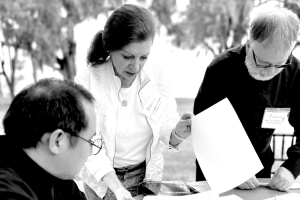But how do you get through the pain?”
Although tears fill her eyes, the woman’s voice is adamant as she directs this question to the leader of the bereavement group. Every person in the church’s parish center nods silently as they look at the woman with empathy and understanding. Their nods say: We’ve been there. Their eyes say: We feel for you.
The leader pauses, then says, “Grief is a normal part of loving someone. When you love somebody, you’re giving them a piece of your heart, and of course when you lose that you should feel it. [The pain] isn’t something you get over. It’s something you learn to live with.”
The group sits quietly, connected in the moment and in their shared experience. Although each person present has their own unique story, all have loved, lost, and grown familiar with the pain of grief.
Loss is an inevitable part of living. Grief, experts agree, is a natural, emotional reaction to any type of loss. Like all human experiences, grief is multifaceted. It is characterized by a range of feelings, including but not limited to sadness, hopelessness, depression, fatigue, numbness, anger, and guilt. The people with whom I spoke as I wrote this article all agreed that grief is nonlinear and, in many ways, unpredictable. Each person follows their own path of grieving. They also agreed that grief is more than feelings.
Nora McInerny, who cofounded an online support community called the Hot Young Widows Club after her husband died from an aggressive brain cancer in 2014, states in her book by the same name: “Grief is sadness, but it’s also an unscratchable itch, an insatiable hunger, an unsoothable ache. It is an extreme discomfort that’s both spiritual and physical. After Aaron’s death, I could feel my heart beating harder and faster in my chest. The muscles in my shoulders, neck, and head tightened into thick knots. My head ached constantly.”
Lisa, who lost her father the summer following her junior year of college, also noticed the physical nature of grief, sharing that she has never felt more tired than in the year following her dad’s death. “I have this distinct memory of feeling like I couldn’t get out of bed, six months later,” she says. Lisa also notes how grief impacted her memory and appetite, saying that “the physical feelings continue to surprise me.”
In addition to the emotional and physical repercussions, grief presents logistical and financial challenges. From paying for funeral expenses to updating mortgages, credit card agreements, insurance plans, and more, dealing with the logistical realities of losing a loved one is overwhelming even to a person who isn’t suffering the emotional turmoil of significant loss. Unfortunately, our social structures do little to support this process. No current federal laws require employers to provide employees either paid or unpaid bereavement leave. The average employer gives only three days’ paid time off when an employee loses a spouse, parent, sibling, or child.
Grief can announce itself at unexpected and surprising times. We expect grief to show its face in the aftermath of a loss, but sometimes grief arrives uninvited before loss enters the scene. There’s a term for this: anticipatory grief. David Kessler, who with Elisabeth Kübler-Ross cowrote On Grief and Grieving: Finding the Meaning of Grief through the Five Stages of Loss (Scribner) and founded Grief.com, defines anticipatory grief as “that feeling we get about what the future holds when we’re uncertain.” He says that its focal point is usually death—like when we think about losing someone we love—but it can also pertain to “more broadly imagined futures,” such as picturing our world after facing a natural disaster, a devastating war, or climate change.
Or a deadly virus and global pandemic.
In times like these, loss is multifaceted. Our world is shaken as we anticipate and fear losing our health and the well-being of loved ones. We also grapple with losses of planned trips and celebrations, certain freedoms, employment, and retirement savings. These sorts of events crack our sense of safety and leave us reeling from both anticipatory and in-the-moment grief.
Although ours is often a death-denying culture, a conversation about loss and grief is essential if we want to support our grieving friends, coworkers, community members, and fellow citizens. Caring for our bereaved networks is not only a part of being an emotionally sensitive person, it’s also a mandate of our faith.
Through scripture, we are privy to Jesus’ ministry of presence as he visited mourners, sat with them in their sorrow, and wept with them. Inspired by his life and teachings, all Catholics are instructed through the corporal and spiritual works of mercy to comfort the sorrowful. Here’s how to put this directive into action in practical terms.
Who is grieving?
Benjamin Franklin wrote in 1789 that nothing in this world is certain “except death and taxes.” If death is certain, then so is grieving for all people who choose to love. That being said, we do not tread through our social interactions assuming that all people are grieving, in part because we sometimes fail to recognize losses as significant.
In 1985 Kenneth Doka coined the term disenfranchised grief to refer to the pain of a significant loss that is not openly acknowledged or socially supported. These losses include everything from the death of an ex-spouse to a first-trimester miscarriage, as well as losses other than death, such as a debilitating diagnosis or the ending of a marriage. Christina Zampitella, a clinical psychologist and thanatologist, includes adults who survive siblings among the disenfranchised grievers, because many people fail to acknowledge the magnitude of the loss experienced. In Zampitella’s words, the disenfranchised griever “is expected to resume his or her life as though nothing has happened.”
Because social support and acknowledgment promote productive grieving, it’s important to pay special attention to the following people whose losses tend to go unnoticed.
People whose loss is not death.
One man I interviewed, Frank, spoke of the loss his wife faced after she experienced a life-altering stroke. Although the stroke did not impact her cognition, it paralyzed half of her body and prevented her from teaching middle school math, an occupation that had previously brought her tremendous joy and meaning. “I think she deeply, deeply grieved not being in the classroom. That was very much a part of her identity,” Frank says. “She got used to it, like we get used to all sorts of things after a while, but initially it was very difficult.” In times of global crisis, like the pandemic we are currently facing, nondeath-related losses abound, including unemployment, social changes (much relied-upon Alcoholics Anonymous meetings were forbidden, commencement ceremonies were cancelled), and spiritual loss (communal worship was halted, funerals and weddings were postponed). These losses have the potential to rock our sense of safety and meaning.
People who experience a loss that isn’t typically discussed.
A salient example of this type of loss is miscarriage. Although the March of Dimes estimates that as many as 50 percent of all pregnancies end in miscarriage, many parents keep the experience to themselves. Maggie, whose first pregnancy ended in miscarriage, talks about how touched she was when people acknowledged her loss. She gets choked up remembering how the nurse from her doctor’s office called and said, “I just wanted to let you know that we heard about the miscarriage and wanted to say sorry.”
People whose loss isn’t recent.
Contrary to popular clichés, the people I interviewed for this article agree that time doesn’t heal, at least not in the ways we might expect. “My theory on grief is that it never goes away,” Frank says. “What happens is the intervals between incidences of grieving get longer. But when they come, there is a sharpness that is very much related to the original.” In other words, just because someone’s loss happened a year, five years, or even 15 years ago doesn’t mean that their pain is gone. Lisa, when looking back on seven years of grieving, thinks the second year is the hardest, in part because people stop asking about the loss.
People who experience more distant losses.
We expect the spouses, children, siblings, and close friends of a deceased person to grieve. But often, more distant circles of acquaintances are also touched by a loss. One woman I interviewed spoke of the period of intense grieving she went through after three losses occurred almost simultaneously in her life: a youth leader from her teen years, a good friend’s father, and another friend’s brother. These individuals were not in her inner circle of relationships, but the quick succession of their deaths left her reeling.
Consolation ministry in parishes
In her article “Dealing with Feelings: Successful Grieving,” published in The American Journal of Nursing, Ruth Dailey Grainger describes loss as a wound and writes that the object of grief work is to “encourage the wound to heal, leaving a scar, a palpable reminder, a useful reweaving of tissue that ‘holds us together,’ different from our unblemished skin, but strong [and] functional.” While we will never be the same after a loss, healing is possible. The people and institutions in our lives, including our faith communities, can help us with this crucial work. Here are a few examples of practices that parishes adopt to support their grieving members.
Include personalized components in funeral rituals.
While allowing a family to choose the readings and music for their loved one’s funeral is a standard practice, some parishes include additional personal elements. For example, Maureen Saldarini, the funeral coordinator at the Jesuit Parish of St. Ignatius of Loyola in Chestnut Hill, Massachusetts, writes individualized prayers of the faithful for the 30 to 40 funerals at her parish each year. Similarly, St. Jude Thaddeus Catholic Church in Albuquerque, New Mexico gives families the option to pray a personalized rosary in the half-hour preceding the funeral Mass. Instead of following the joyful, sorrowful, or glorious mysteries, the personalized rosary follows the life of Jesus and incorporates the deceased’s name and details into the combination of mysteries. For example, the rosary names both the nativity of the Lord and the birthday and name of the deceased, and during the mystery of light, someone offers a very abbreviated eulogy acknowledging the deceased’s vocation and close family members.
Offer a special remembrance service and opportunities to connect.
After St. Jude Thaddeus’ annual memorial prayer service, the attendees gather together in the church hall. Mary Papuyo, the volunteer who coordinates the parish’s bereavement ministry, says a focal point of the gathering is a slideshow that incorporates photographs and memories of parishioners’ deceased loved ones. “People enjoy the sense that the church isn’t forgetting their family member,” Papuyo says. The photographs open the door for conversation among the people gathered.
Maureen Saldarini at St. Ignatius also coordinates an annual remembrance service, inviting families who have held funerals at the parish in the past year and welcoming them to bring a photograph of their loved one. One woman whom I interviewed, Nina, remembers attending this service several years ago after her brother died. Because Nina is no longer a practicing Catholic, the church wasn’t the place she turned to for grief support. Yet she remembers being touched by the invitation and by the service itself, calling it an “appreciated and nice gesture.”
Provide some sort of grief group.
Parishes offering bereavement groups take different approaches to this component of their ministry. At Saints Rose and Clement Parish in Warwick, Rhode Island, Alberta Baccari, a volunteer parishioner and social worker, runs a group that focuses on understanding grief. She educates the attendees about Elisabeth Kübler-Ross’ five stages of grief and uses the model to remind the people gathered that they are not alone in their experience of grief.
Following the “loss of a loved one, people experience feelings of isolation, anxiety, and loneliness,” Baccari says. “They gain strength from understanding that these emotions are normal and others have experienced similar feelings.” Saldarini at St. Ignatius runs an eight-week program that invites attendees to share stories, photographs, and memories of their loved ones. Participants discuss the tasks and struggles of mourning, including how to approach the holidays, what to do when the casseroles and support stop coming, and why caring for yourself spiritually, physically, and mentally is so important. Although Baccari’s and Saldarini’s groups differ, both offer a community with grief as its center.
Support the bereaved
Churches have a role to play in supporting the grieving, and so do each of us. Often what hinders us from offering support isn’t a lack of care but rather a lack of confidence. We are afraid of saying or doing “the wrong thing,” so we don’t do anything. Grieving people, however, know that the support they receive from friends, neighbors, coworkers, and acquaintances outweighs any potential faux pas. In fact, they tend to agree that the only wrong action is nonaction. With that in mind, the people I interviewed offered a few suggestions for how to support grieving individuals based on their own experiences.
When at all possible, attend services.
“Whether I like to admit it or not, I know who was there,” one woman I interviewed says. “If people can physically show up, that’s important.” Another recalls how impactful it was to see a church crowded with family, friends, and strangers at her brother’s funeral. Another remembers how much it touched her to see her high school boyfriend’s parents—people she hadn’t seen in years—at her dad’s wake. Unless specified in the obituary, funerals tend to be open to the public. So if you are able to demonstrate your care through attendance, do.
Reach out.
No matter how well you knew the deceased or their family members, don’t hesitate to get in touch. “People I didn’t know wrote cards and it still meant a lot,” Lisa says. Similarly, Nina recalls how comforting it was to hear memories and expressions of love from her brother’s acquaintances, from his close friends to people who had met him just once. “For me, a huge takeaway from the experience is that whenever I hear a person died I’ll just reach out,” Nina says. “People ask, ‘Do I need to send a card? Is a text too informal?’ Any way someone told me that they were thinking of me or my family [was] appreciated.” Equally important to reaching out in the immediate aftermath of a death is continuing to reach out as time goes by. “It’s helpful when someone remembers an important date,” Lisa says. Put a reminder in your calendar for the deceased’s birthday and death anniversary and check in on those days.
Instead of offering to help, just help.
The phrase “What can I do to help?” is typically unhelpful. Author McInerny writes, “I grew to hate that question, because it felt more like receiving a request: ‘Hello, Nora, I’d like to help you. Please think of a task you’re comfortable with a stranger performing, and humble yourself enough to ask me if I have the time or interest to do it.’ ” Instead of asking this question, leave a bag of practical items—paper plates, toilet paper, postage stamps, or anything that is used frequently in the aftermath of a loss—on the bereaved family’s porch or send a more sentimental care package. Another person with whom I spoke, Rachel, remembers crying at school after learning of a beloved mentor’s death and being deeply moved when a friend who saw her later delivered a packet of hyacinth bulbs with a note saying, “When everyone else around you appears to be dying, nurture something else to life.”
Ask about the deceased.
“People are so scared to bring up your dead person,” Lisa says, “but I think about him all the time, and so it’s such a relief when people ask.” Nina fondly recalls the time when she met a friend of a friend years after her brother died, and the woman said to her, “I don’t want to bring up anything bad, but when I heard your brother died it really impacted me. I want to let you know that I’m so sorry and have thought about you a lot.” The woman’s comment demonstrated her care and gave Nina the chance to talk about her brother, which continues to be a source of healing for her. In other words, talking about the deceased is not a taboo subject. “If someone mentions that a family member died,” Lisa says, “don’t be afraid to bring it back up.” Ask about their personality, hobbies, and favorite things. “Bring them into the room. If someone doesn’t want to talk about their person, they won’t,” Lisa says.
Acknowledge the loss and honor the grief.
Loss and grief do not look the same for any two people, and sometimes we may discover that a person we didn’t expect to be is grieving. Remember, we are not called to be arbiters of grief but rather wells of mercy and compassion. We cannot know what someone else is experiencing, so ask questions, honor feelings, and tread gently.
This article also appears in the July issue of U.S. Catholic (Vol. 85, No. 7, pages 27-31). Click here to subscribe to the magazine.
Image: Unsplash













Add comment